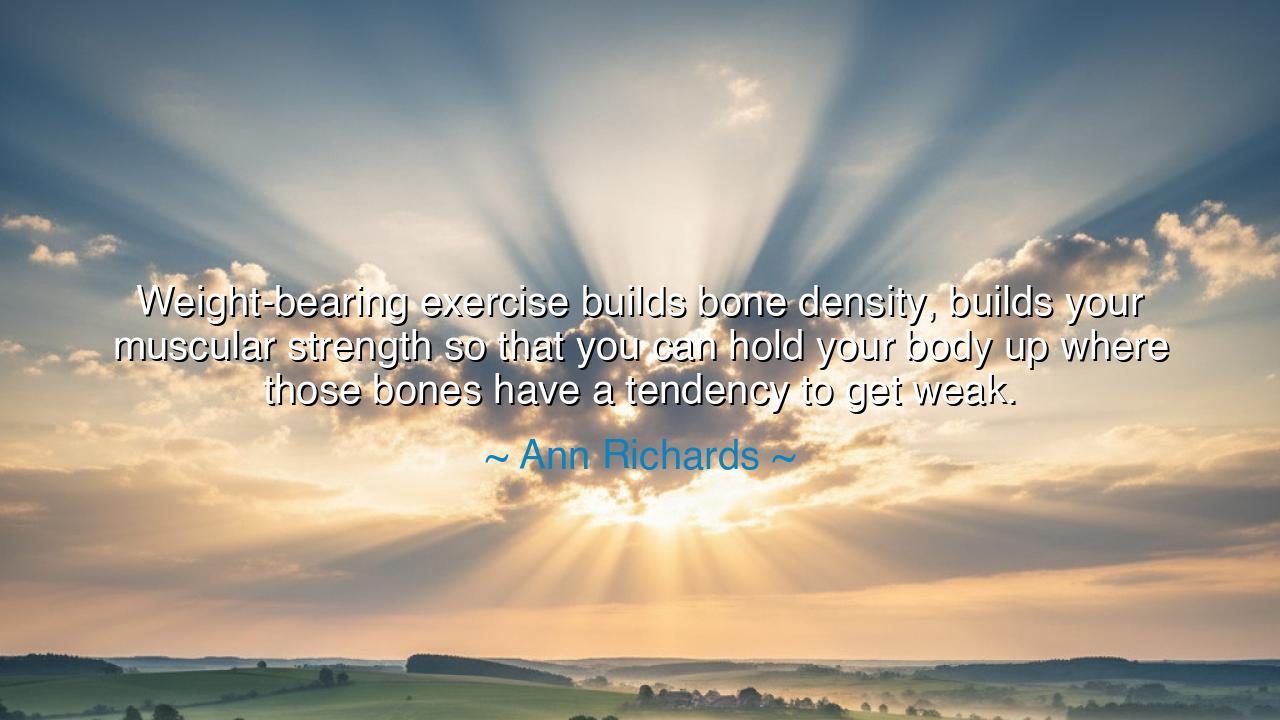
Weight-bearing exercise builds bone density, builds your
Weight-bearing exercise builds bone density, builds your muscular strength so that you can hold your body up where those bones have a tendency to get weak.






The voice of Ann Richards, the fiery governor of Texas, resounds with wisdom that transcends the body and touches the very spirit: “Weight-bearing exercise builds bone density, builds your muscular strength so that you can hold your body up where those bones have a tendency to get weak.” Though spoken of flesh and bone, these words are also a metaphor for life itself. For just as the body must be tested to grow strong, so too must the soul endure its trials to stand upright in the face of weakness.
To speak of weight-bearing exercise is to speak of struggle embraced willingly. It is the act of placing burden upon oneself, not to be crushed, but to be made resilient. The bones, when pressed, grow denser; the muscles, when strained, grow stronger. So too does the human spirit, when tested by hardship, grow unbreakable. Without resistance, there is decay; without labor, there is fragility. Richards teaches us that to bear weight is not to invite ruin, but to forge endurance.
Consider the life of the Spartan warriors. From youth, they carried shields heavier than their bodies, ran across mountains with armor upon their backs, and bore pain as though it were a teacher. Their bones grew sturdy, their muscular strength unyielding. Yet more than this, their hearts became tempered like steel. Because they bore the weight of discipline and sacrifice, they could hold not only their bodies but the very fate of their city upright. It was not softness but strain that preserved them.
And so it is with us. In the frailty of age, the bones may falter; without care, they crumble into dust. Richards reminds us that the antidote is not in avoidance, but in bearing weight, in pressing the body to resist decline. Likewise, when the spirit begins to weaken under the years, the only remedy is to take up the burdens of discipline, responsibility, and purpose. By doing so, one holds the body upright, and the soul as well.
The wisdom here is not limited to health, but to life entire. If you shield yourself from struggle, your bones of character weaken, your muscles of resolve atrophy, and you find yourself unable to stand when storms arrive. But if you choose the harder path, if you willingly shoulder the weight of labor, of study, of duty, then you will rise stronger. The very pressures you endure will become the pillars that uphold you.
Let us then take this teaching and make it practical. Do not flee from challenges, for they are your exercise. Lift not only iron weights but also the weight of honesty, of perseverance, of compassion. Walk the harder road, and let each step carve strength into your frame. In your body, practice movement and resistance so that age cannot bow you too soon. In your soul, embrace struggle so that despair cannot bend you low.
Thus, O listener, carry Ann Richards’s words as a commandment of resilience: build strength where there is weakness. Do not wait for the bones to break or the spirit to fail. Begin today — bear weight, endure resistance, and grow unshakable. For the body is the vessel of the soul, and to keep it strong is to honor the gift of life itself.
And in the end, remember this: the burden you choose to bear will not diminish you, but shape you. As stone is shaped by the sculptor’s chisel, as iron is tempered in fire, so are you shaped by the weights you endure. Lift them, and stand tall — in body, in spirit, in destiny.






AAdministratorAdministrator
Welcome, honored guests. Please leave a comment, we will respond soon